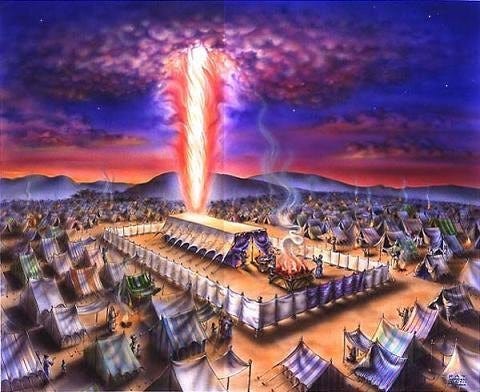"You can do it!" – The Waterboy
In synagogue this week, we will read the closing verses of the Book of Exodus.
We expect to find thunder, lightning, miracles, divine proclamations.
Instead, the text sounds more like a spreadsheet!
From Miracles to Spreadsheets
Our Torah portion, known as Pekudei, is a detailed inventory of all the materials used for the construction of the Mishkan, the portable sanctuary the Israelites carried with them in the wilderness.
It feels like holy bookkeeping. Numbers, lists, materials, measurements.
It's not just boring. It also feels repetitious. All of these details were spelled out earlier in the Torah. Why the repetition? Why end Exodus—the book of drama, freedom, and revelation—with an itemized receipt?
Well, here’s the twist: this isn’t just repetition. It’s transformation.
Vision and Reality
Earlier in the Torah, in the portions of Terumah and Tetzaveh, God lays out the divine blueprint for the Mishkan.
Think of these chapters like architectural plans and design specifications. Terumah describes the structure: gold-covered wood beams, embroidered curtains, and sacred furnishings like the Ark of the Covenant.
Tetzaveh zooms in on the garments and rituals of the priests—their robes, breastplates, and how they’ll serve inside the sanctuary. These are detailed, idealized instructions. They describe what should be.
Now, in Pekudei, we see what actually happened.
Rabbi Raphael Polisuk, drawing from Rav Tzi Yehuda Kook, explains that this duality—the vision and the execution—isn’t redundancy, but reality.
Terumah and Tetzaveh are the dream. Pekudei is the delivery. And things change along the way.
It's like the game telephone. Remember that, when you whisper something to the person sitting next to you, and they whisper to the person sitting next to them, all the way around a circle?
You start with one sentence. And you end up with something different. That's what happens here. But the changes were meant to be.
When you start with God, you also end with God.
Because God is telling us something:
We can do it.
Redemption after Failure
Because after failure, after flaws, after the infamous Golden Calf episode where the Israelites worshipped an idol—the Israelites still build the Mishkan. They bounce back. They get it right.
Rabbi Yehuda Halevi in the Kuzari taught that Judaism stands on two pillars: first, that the Torah is divine. Second—and just as important—that we are capable of fulfilling it.
That second part is easy to forget. We’re so aware of our shortcomings that we assume failure is baked in.
But Pekudei is a love letter to human potential. It doesn’t dwell on perfection. It celebrates perseverance.
The same people who danced before a molten idol are now measuring curtains and hammering sockets with sacred devotion.
Same hands. New heart.
Simone Biles and the Courage to Continue
This is not just redemption. It’s proof.
Proof that failure—or even just stepping back—isn’t the end.
Consider Simone Biles. At the height of the Tokyo Olympics, she withdrew from multiple events—not due to physical injury, but to protect her mental health. Critics called it a failure.
But she returned, not to prove them wrong, but to prove to herself that she could still show up. She won a bronze medal.
But the real victory was internal: reclaiming her own narrative. Her courage to pause and then continue became a powerful model of resilience for millions.
That’s Pekudei energy. Not the glossy highlight reel, but the quiet, stubborn, sacred work of continuing after a fall.
You may stumble. You may break. But the Torah is saying: Get up. Build anyway.
Your Spiritual Receipts
In a culture obsessed with self-critique—internally and externally—Pekudei is a holy pivot. It shifts the spotlight to spiritual success. To the times when you actually did show up, did keep your promise, did align with your values.
Those moments matter. They are your spiritual receipts.
Even the prophet Jeremiah, amid his sternest rebukes, pauses to recall the “kindness of your youth”—Israel’s faithfulness in the wilderness.
Maybe he was thinking of this very moment.






Ttthank you! A much needed illumination for the so called day to day “drudgery of life” for those who don’t seem to achieve in a worthwhile way. Life is full of necessary ingredients who contribute to the final product.